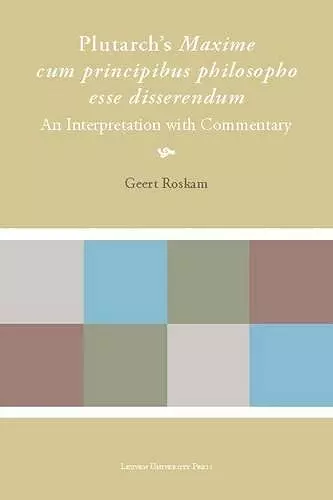Plutarch's "Maxime cum principibus philosopho esse disserendum"
An Interpretation with Commentary
Format:Hardback
Publisher:Leuven University Press
Published:22nd Jun '09
Currently unavailable, and unfortunately no date known when it will be back

The question of the political relevance of philosophy, and of the role which the philosopher should play in the government of his state, was often discussed in Antiquity. Plato’s ideal of the philosopher-king is well-known, but was precisely his failure to realise his political ideal in Syracuse not the best argument against the philosopher’s political engagement? Nevertheless, Plato’s ideal remained attractive for later Greek thinkers. This is illustrated, for instance, by one of Plutarch’s short political works, in which he tries to demonstrate that the philosopher should especially associate with powerful rulers, because he can in this way exert the greatest positive influence on his society and at the same time maximise his personal pleasure. This study provides a thorough analysis of Plutarch’s Maxime cum principibus philosopho esse disserendum. A lengthy general introduction deals with the author and the text and discusses each step in Plutarch’s argumentation in detail. A systematic lemmatic commentary then provides a systematic complement to the previous analysis of the work, dealing with many problems of textual criticism, explaining all kinds of realia, and discussing a great number of passages through parallels from Plutarch’s own oeuvre and from other authors.
R.'s work is clear and in virtually flawless English. The commentary is prudent and informative, and one can imagine the enormous work involved in tracking down all the references both within and without Plutarch's corpus. R. displays a vast knowledge of the secondary literature, even to a pinch of pedantry. On textual matters, he is cautious and respectful but critical of many fanciful conjectures, especially of Barigazzi. Several times he demonstrates the impossibility of suggested conjectures to this difficult text and refrains from making his own. [...]
This is an excellent book and R. deserves credit for producing a work of the highest quality, with mastery of the text, the philosophical tradition, and the secondary literature.
Frederick E. Brenk, Gnomon Bd. 84, 2012, issue 3
Roskam's book is a concise and well executed volume. It is complete as it stands and admirable in explaining Plutarch's thought in his own terms and with his own vocabulary.
Bryn Mawr Classical Review 2011.05.15, reviewed by Eran Almagor, The Hebrew University of Jerusalem
ISBN: 9789058677365
Dimensions: unknown
Weight: 907g
250 pages